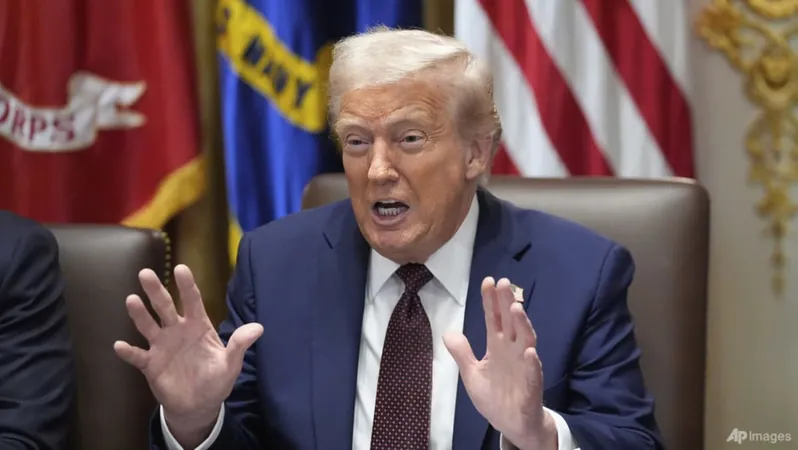
Court Rules Trump's Tariffs Illegal – What Does This Mean for America?
2025-08-29
Author: Yu
In a stunning legal blow, a divided US appeals court has ruled that many of Donald Trump's tariffs are illegal, undermining a cornerstone of his economic strategy. This ruling, delivered on August 29th, sharply criticizes the Republican president's use of tariffs as a tool to reshape international trade.
Despite the ruling, the court has allowed the tariffs to remain in effect until October 14, giving the Trump administration time to appeal the decision to the US Supreme Court. Trump swiftly announced his intention to challenge the court's ruling, declaring it "incorrect" on his Truth Social platform. He remained optimistic, proclaiming that the "United States of America will win in the end" with the Supreme Court's backing.
Under Trump's leadership, tariffs have become a critical aspect of US foreign policy, aimed at pressuring nations into renegotiating trade agreements. While these tariffs have sometimes allowed the administration to gain economic concessions, they have also contributed to significant instability in financial markets.
The court's decision, which passed with a 7-4 vote, found that while the president holds substantial power during national emergencies, those powers do not explicitly include the ability to impose tariffs. According to the ruling, the International Emergency Economic Powers Act (IEEPA) does not grant such authority.
Historically, IEEPA was designed for imposing sanctions rather than tariffs, raising concerns that Trump has overstepped his bounds as the first president to implement tariffs under this act. The court insightfully pointed out that it is unlikely Congress intended for this law to provide unlimited tariff authority to the executive branch. Furthermore, Trump's tariffs targeting countries like China, Canada, and Mexico were justified by citing trade imbalances and drug trafficking, claims which those countries vehemently dispute.
As the market reacts—with minimal shifts noted in after-hours trading—financial experts suggest that businesses will likely continue operating under the assumption that the tariffs will stay in place while the legal battle unfolds. Brian Jacobsen, chief economist at Annex Wealth Management, indicated that the Trump administration might leverage alternative legal channels to maintain its tariff policies.
The appeals court examined two cases opposing the tariffs: one from five small US businesses and another from 12 Democratic-led states, both arguing that IEEPA does not authorize tariffs. The Constitution dictates that taxing authority lies with Congress, demanding that any delegation of such power be explicit and limited.
Compounding the controversy, the US Court of International Trade previously ruled against Trump's tariff strategy back in May, asserting that he exceeded his authority. This legal tug-of-war underscores the mounting opposition to Trump's trade policies, with at least eight lawsuits now challenging their legality.
As the Supreme Court looms on the horizon, the outcome of this legal battle could reshape the future of American trade policy and influence the delicate balance of power between the president and Congress.






 Brasil (PT)
Brasil (PT)
 Canada (EN)
Canada (EN)
 Chile (ES)
Chile (ES)
 Česko (CS)
Česko (CS)
 대한민국 (KO)
대한민국 (KO)
 España (ES)
España (ES)
 France (FR)
France (FR)
 Hong Kong (EN)
Hong Kong (EN)
 Italia (IT)
Italia (IT)
 日本 (JA)
日本 (JA)
 Magyarország (HU)
Magyarország (HU)
 Norge (NO)
Norge (NO)
 Polska (PL)
Polska (PL)
 Schweiz (DE)
Schweiz (DE)
 Singapore (EN)
Singapore (EN)
 Sverige (SV)
Sverige (SV)
 Suomi (FI)
Suomi (FI)
 Türkiye (TR)
Türkiye (TR)
 الإمارات العربية المتحدة (AR)
الإمارات العربية المتحدة (AR)